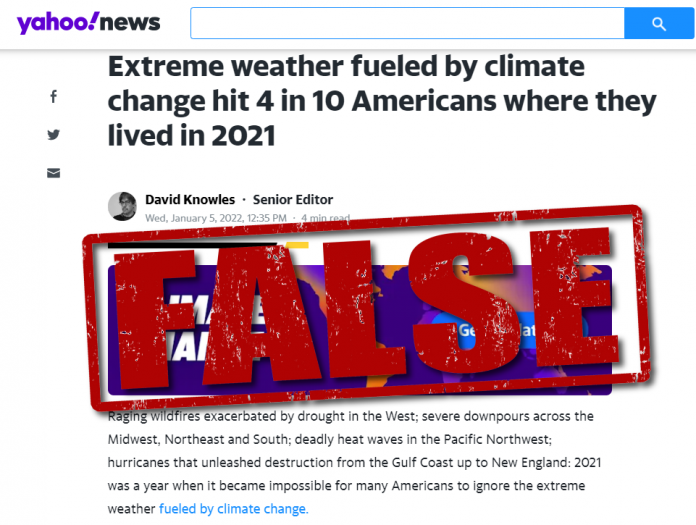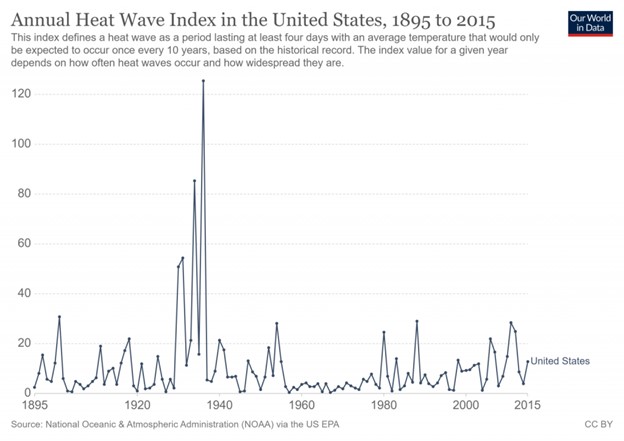Yahoo News posted an article titled, “Extreme weather fueled by climate change hit 4 in 10 Americans where they lived in 2021,” saying climate change is responsible for an increase in the instances and severity of extreme weather. This is false. Millions of Americans are affected by extreme weather events every year, however, data do not show instances of extreme weather are becoming more common or more severe. This fact is confirmed by the U.N. Intergovernmental Panel on Climate Change (IPCC).
“Raging wildfires exacerbated by drought in the West; severe downpours across the Midwest, Northeast and South; deadly heat waves in the Pacific Northwest; hurricanes that unleashed destruction from the Gulf Coast up to New England: 2021 was a year when it became impossible for many Americans to ignore the extreme weather fueled by climate change,” writes Yahoo News.
Each of the weather events cited by Yahoo News did happen, but there is no evidence they were caused or exacerbated by climate change.
Yahoo News writes a length about heatwaves that struck the portions of the United States in 2021, but, as explored in Climate at a Glance: Heatwaves, heatwaves, extended periods of extreme above average temperatures, have been far less frequent and severe in recent decades than was the case during the 1930s – nearly 100 years of global warming ago. Indeed, majority of each state’s all-time high temperature records were set during the first half of the 20th (see the figure).
Also most the accurate nationwide temperature station network, the U.S. Climate Reference Network, established by the National Oceanic and Atmospheric Administration, shows no sustained increase in daily high temperatures in the United States since at least 2005.
Yahoo News also implies that the wildfires experienced across the Western United States, and the flooding experienced in other locations were exacerbated by climate change. Once again, the data does not bear this claim out.
Concerning flooding there is no evidence flooding frequency or severity has increased as the climate has modestly warmed over the past 150 years. The IPCC reports it has “low confidence” in any climate change impact regarding the frequency or severity of floods, or in even a “sign” of any change. This means, if the IPCC is correct, climate change is just as likely to be making floods less frequent and less severe as it is to making them more frequent or severe.
Nor does data from either the IPCC or the U.S. National Interagency Fire Center show wildfires have worsened when compared to historical fire seasons. Far fewer acres have been burned in wildfires in recent years than were recorded in the early part of the 20th century. What’s true for the United States is true for the Earth in general. NASA’s satellites have been measuring global wildfires since 1998. NASA’s data show global acreage lost to wildfire has declined 24 percent since 1998. Also, research published in the peer-reviewed Journal of Geophysical Research, analyzing global wildfires back to the year 1901, shows a trend of declining wildfires dating back more than 100 years. The scientists report “a notable declining rate of burned area globally.”
National and international data also show no increase in the number or intensity of droughts, hurricanes, or tornadoes over the period of recent modest warming, making it impossible for Yahoo News to honestly claim climate change is making weather more extreme, because weather hasn’t been more extreme.
Yahoo News may be right that four in 10 Americans were effected by extreme weather events in 2021. However, wildfires and hurricanes occur seasonally, and floods, tornadoes, and droughts impact portions of the United States every year, meaning millions of Americans are impacted by extreme weather every year.
If, in 2021, an unusual number of Americans were impacted by extreme weather, it is not due to a climate induced change in weather patterns, but rather because an increasing number of people live in locations where natural disasters are common. Demographic data show a long-term trend of ever greater numbers of people moving to coastal areas prone to hurricanes and into arid, forested areas where wildfires are common, for example.
More people putting themselves into harm’s way, not worsening weather, is responsible for any increase in the number of people impacted by extreme weather.




